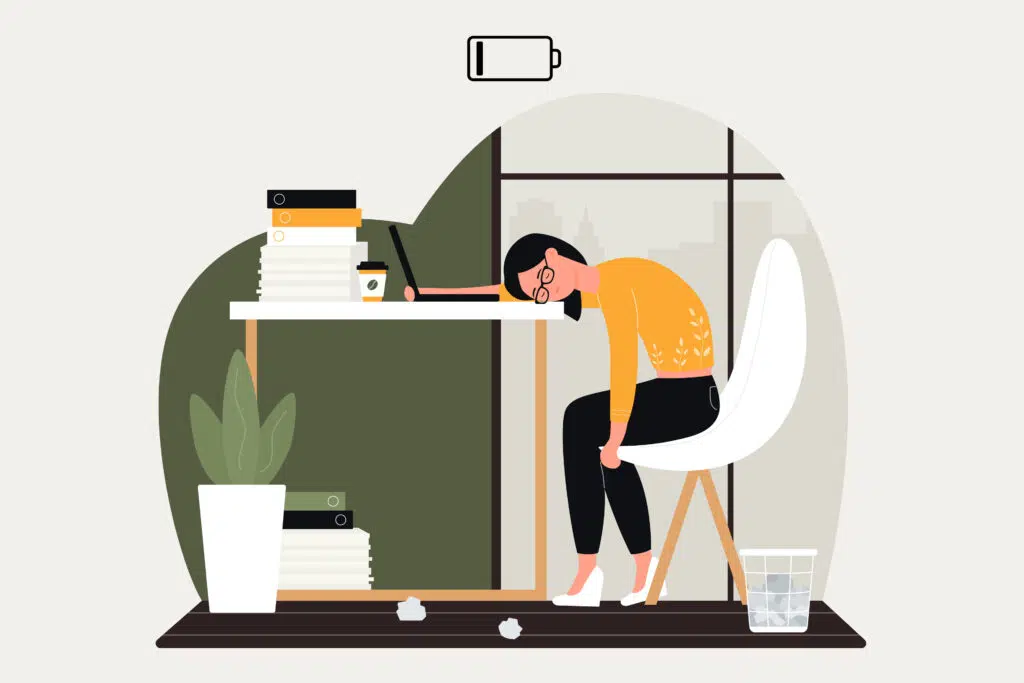How to Overcome Procrastination and Anxiety

Procrastination is a very typical human experience. At some point or another, we’re all guilty of putting off that task we know is important. Maybe it’s household chores, filling your taxes, paying bills, or some other mind-numbingly boring task. While everyone may occasionally procrastinate, if you’re constantly overwhelmed by tasks and feel procrastination and anxiety taking over, it could be time to seek professional help.
Here’s a look at the link between procrastination and anxiety, tips for breaking the cycle, and when to speak to a therapist.
Understanding the Link Between Procrastination and Anxiety
If you’re always putting off tasks, you’re not alone. One study on procrastination found that up to 25% of adults are chronic procrastinators. Procrastination is associated with symptoms of anxiety, depression, and stress.
So, does anxiety cause procrastination or is it the other way around?
Well, it’s not quite as simple as that. Procrastination and anxiety are very much intertwined by nature. Procrastination is not being lazy and not a character flaw; it’s more complex than that.
Procrastination is often used as a coping tool to avoid negative emotions. Many people frequently put off tasks to avoid dealing with the negative emotions associated with them. These could be frustration from performing a task or anxiety associated with a performance. While avoiding the task can provide relief in the moment, it can make the anxiety worse over time.
On the flip side, anxiety can fuel procrastination. Some tasks can trigger anxiety, which can make an individual feel overwhelmed and unable to start. Overall, this can create a cycle of procrastination and anxiety. So, when you feel anxious, you procrastinate, which can increase stress. Then, the increased stress from procrastination can lead to higher anxiety and the cycle continues.
For instance, an individual with a work deadline looming is worried about not being good enough and delays the work, which amplifies the anxiety and stress as the deadline approaches.
Common Causes of Procrastination and Anxiety
There are a few different causes that contribute to anxiety and procrastination:
- Fear of Failure: The anxiety of failing and not meeting expectations contribute to the avoidance of a task.
- Perfectionism: The need to be perfect and achieve a flawless (and often unrealistic) result creates a type of paralysis that prevents the start of a task.
- Lack of Motivation: The task is viewed as pointless or irrelevant, but the anxiety increases as the deadline gets closer.
- Feeling Overwhelmed: Some tasks just feel entirely overwhelming and you have no idea where to start, which contributes to not starting at all.
- Easily Distracted: Social media, phones, devices, notifications can all be distracting, making it difficult to stay focused.
- Poor Time Management: The inability to prioritize, manage time, or break down tasks can increase anxiety and stress around the task.
- Disinterest: This is when a task is boring, uninteresting, or unpleasant, so you don’t want to start.
- Decision Fatigue: When you make lots of decisions, it can drain your mental energy to the point that you don’t want to make any more decisions.
People experience procrastination for any number of reasons and these causes often intertwine. The anxiety feeds into the procrastination, and it can feel difficult to break the cycle.
Strategies to Break the Cycle of Procrastination
Overcoming procrastination involves a combination of intentional behavioral changes, positive thoughts, and small steps to take action.
Here are some strategies to break the cycle of procrastination one step at a time:
- Just 5 Minutes: Do the task for 5 minutes, and the chances are that if you do it for 5 minutes, you will probably finish it.
- Pomodoro Technique: The Pomodoro technique involves working in 25-minute periods followed by a break. The technique aims to reduce tasks into manageable amounts so it doesn’t feel so overwhelming.
- Cognitive Restructuring: Cognitive restructuring is a CBT technique that aims to identify and challenge negative thoughts and feelings that contribute to procrastination and replace them with more positive, balanced ones.
- Breaking Down the Task: Divide the task into smaller, manageable chunks. This technique aims to reduce overwhelming feelings that prevent you from starting.
While there are plenty of different strategies to break free from procrastination, it’s important to be kind to yourself. Try to understand why you procrastinate and stay compassionate, instead of being overly self-critical.
Mindfulness Techniques to Reduce Anxiety
In a review of over 200 studies, researchers found that mindfulness is especially useful for reducing depression, anxiety, and stress. Mindfulness has two main elements: attention and acceptance. Mindfulness classes and techniques help to equip individuals with the tools to be fully present and focus on what’s happening in the moment. At the same time, mindfulness helps you to accept and let go of feelings and sensations as they flow past you.
If you find that anxiety is fueling procrastination, here are some mindfulness techniques to reduce anxiety:
- Body scan meditation involves scanning your body and being aware of all the sensations you feel without judgment. Its goal is to improve body awareness and relaxation.
- Deep breathing focuses on the breath in one place, like your belly or chest. As you take deep breaths, stay concentrated on that one area.
- Guided meditation is a type of meditation that refers to a meditation with a teacher or practitioner who leads the meditation. It can be in-person, online, or using apps.
Mindfulness is by no means an overnight fix, but developing the skill can help you to manage stress and anxiety. Techniques to help manage anxiety are not a replacement for therapy, but can be a valuable tool for well-being.
Building Habits to Stay Productive and Calm
While some people feel like natural organizers and early birds, for others, being productive, on time, and organized takes a lot more work. After all, organization, time management, and productivity are all skills that anyone can learn.
Here’s why good habits set a healthy foundation for managing anxiety and procrastination:
- Habits create structure and predictability.
- Habits reduce decision fatigue and automate routine.
- Healthy habits help provide healthy coping mechanisms.
- Habits can build momentum and support productivity.
To get started, here are some simple habits to help stay productive and calm:
- Short daily mindfulness
- Regular exercise
- Consistent sleep schedule
- Plan your day
- Limit screen time
- Eat healthy foods
- Take regular breaks
- Write down your thoughts
- Practice deep breathing
Professional Support in Overcoming Procrastination and Anxiety
If you’re dealing with anxiety-related procrastination, it’s important to acknowledge the anxiety, which is where a therapist can help. While it can feel natural, avoiding an uncomfortable task normally worsens the anxiety over time. You might be anxious about a specific project, or struggling with anxiety symptoms. Procrastination can be closely linked with anxiety, and when anxiety flares up, it can feel like a task is just too much to handle. If anxiety and procrastination affect your daily life, relationships or work, self-care techniques are not working for you, or you feel like you’re at a crossroads, please reach out for help.
Therapy can help to address anxiety, explore triggers, and help to equip you with the tools to manage anxiety symptoms and feel back in control. Procrastination can occur for all sorts of reasons. A therapist can help you explore why you put off tasks and create a step-by-step plan to address anxiety and procrastination.
Here are some tools, strategies, and techniques a therapist may use to help people with anxiety and procrastination:
- Cognitive restructuring to help individuals identify and challenge negative thought patterns that fuel both anxiety and procrastination.
- Teach practical skills for prioritizing tasks, breaking them into smaller steps, and managing time effectively.
- Exposure therapy to help individuals gradually confront feared situations or tasks to reduce anxiety and avoidance.
- Teach mindfulness and stress-reduction techniques to cultivate present-moment awareness and reduce stress.
- Help individuals set realistic goals and develop a concrete plan to achieve them, fostering a sense of control.
Let’s say you have an individual with social anxiety disorder. A therapist might use cognitive restructuring techniques to challenge negative emotions and thoughts surrounding social interactions. The therapist may use gradual exposure techniques to desensitize a triggering environment, and teach time management steps to break down big tasks into smaller, manageable ones.
Ready to Overcome Procrastination and Anxiety?
If you feel that anxiety and procrastination are holding you back in life, you’re not alone. Don’t let finding a therapist add to your stress. At Thriving Center of Psychology, we make starting therapy simple. Just fill out our quick questionnaire and we’ll match you with a therapist who understands your struggles. Let’s begin your journey together!

How to Overcome Procrastination and Anxiety
Procrastination is a very typical human experience. At some point or another, we’re all guilty of putting off that task we know is important. Maybe it’s household chores, filling your taxes, paying bills, or some other mind-numbingly boring task.

How to Build a Consistent Routine That Combats Depression
Depression can feel like a pit you can’t escape from, but know that depression is treatable with the right help. A basic daily ritual encourages healthy habits like a regular sleep schedule, healthy food choices, and exercise that support mental health.

How to Manage Stressful Life Transitions and Events
From getting into college or having a baby to splitting from a spouse or experiencing the death of a loved one, life can surprise you with big wins and tear you down with loss. Life is filled with transitions, some happy, others stressful and difficult.

How Long Does it Take to Recover from Burnout?
If you’ve reached burnout, it describes a state of complete emotional, physical, and mental exhaustion. Between heavy workloads, toxic work environments, economic uncertainty, and a poor work-life balance, burnout is a very real problem that can affect all aspects of your health.

